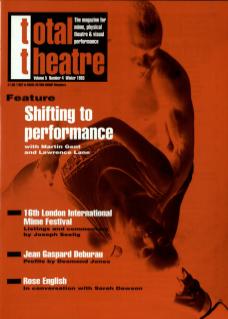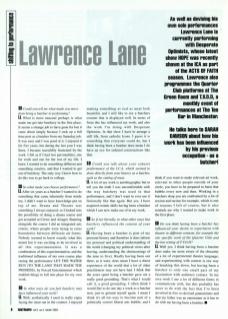SD: Could you tell me what made you move from being a butcher to performing?
LL: What is more unusual perhaps is what made me get into butchery in the first place. It seems a strange job to have gone for but it came about simply because I took up a full-time post as a butcher from my Saturday job. It was easy and I was good at it. I enjoyed it for five years, but during the last year I was there, I became incredibly frustrated by the work. I felt as if I had two personalities, one for work and one for the rest of my life. I knew I wanted to do something different and something creative, and that I wanted to get out of butchery. The only way I knew how to do this was to go back to college.
SD: So what made you choose performance?
LL: After six years as a butcher I wanted to do something that came inherently from inside me, I didn't want to have knowledge put on top of me. Drama and Theatre was something I always enjoyed, so I looked into the possibility of doing a drama course and got accepted at Crewe and Alsager. Running alongside the course I did an integrated arts course, where people were trying to cross boundaries between different art forms. Nobody seemed to know exactly what this meant but it was exciting to be involved in all this experimentation. It was a combination of this experimentation, and the traditional influence of my own course plus seeing the performance Let the Water Run (To the Land the Made the Promise) by Forced Entertainment which enabled things to fall into place for my own work.
SD: In what ways do you feel butchery may have influenced your work?
LL: Well, aesthetically I used to really enjoy laying the meat out in the counter. I enjoyed making something as real as meat look beautiful, and I still like to see a butcher’s counter that is displayed well. In terms of form this has influenced my work, and also the work I'm doing with Desperate Optimists. In that show I have to arrange a still life, from catholic Icons. I guess it is something that everyone could do, but I think having been a butcher does mean I do have an eye for ordered constructions like that.
SD: Could you talk about your cabaret performance at the ICA which seemed to draw directly from your history as a butcher, such as the cutting of meat.
LL: A lot of my work is autobiographic but to tell you the truth I was uncomfortable with the way butchery was used in that performance, and I don't want to ever use it fictionally like that again. But yes, I have acquired certain skills having been a butcher which I can now make use of in my work.
SD: So if not literally, in what other ways has butchery influenced the content of your work?
LL: Having been a butcher is part of my personal history and therefore it does inform my personal and political understanding of the world (changing my political views after leaving, understanding the shortcomings of the nine to five). Really having been out there, as it were, does mean I have a direct experience of the world that a lot of other practitioners may not have had. I think that the years spent being a butcher gave me a really good grounding. That's what I would call it, a good grounding. I often think I would like to do one day a week as a butcher now, just to ground myself again. I mean I think it's all too easy to become part of a politically correct liberal arts bubble, and I think if you want to make relevant art work, relevant to other people outside of your circle, you have to be prepared to burst that bubble every now and then. Working in a butcher’s shop you are confronted by a lot of sexism and racism for example, which is one of the reasons I left of course, but it also reminds me why I wanted to make work in the first place.
SD: Do you think having been a butcher has influenced your desire to experiment with theatre in different contexts, for example the site-specific work of the Quarter Club and the bar setting of TVOD?
LL: Well yes, I think having been a butcher does make me more aware of the obscurity of a lot of experimental theatre language, and experimenting with context is one way of breaking this down, but having been a butcher is only one small part of my fascination with audience contact. In my own work I use a lot of different forms to communicate with, but this probably has more to do with the fact that I've been involved in five co-devised pantomimes and that my father was an entertainer as it has to do with me having been a butcher.

